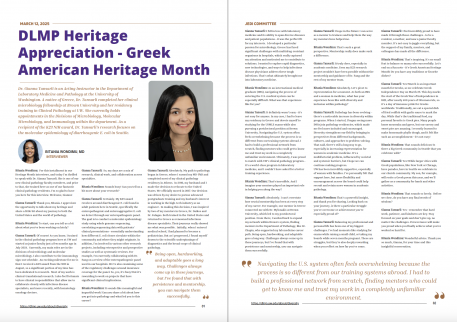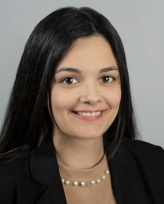DLMP Heritage Appreciation - Greek American Heritage Month
March 12, 2025

Interview by Bitania Wondimu, MD
Dr. Gianna Tansarli is an Acting Instructor in the Department of Laboratory Medicine and Pathology at the University of Washington. A native of Greece, Dr. Tansarli completed her clinical microbiology fellowship at Brown University and her residency training in Clinical Pathology at UW. She currently holds appointments in the Divisions of Microbiology, Molecular Microbiology, and Immunology within the department. As a recipient of the K23 NIH award, Dr. Tansarli's research focuses on the molecular epidemiology of diarrheagenic E. coli in Seattle.

Bitania Wondimu: For this installment in our Heritage Month interviews, and today I’m thrilled to speak with Dr. Gianna Tansarli. She is one of our new clinical pathology faculty members, and prior to that, she trained here as one of our fantastic clinical pathology residents. I’m so glad to have you here for this interview. Welcome, Gianna!
Gianna Tansarli: Thank you, Bitania. I appreciate the opportunity to talk about my heritage and share a little bit about my journey to both the United States and the world of pathology.
Bitania Wondimu: To start, can you tell us a bit about what you’ve been working on lately?
Gianna Tansarli: Of course! As you know, I trained in the clinical pathology program here at UW and started as junior faculty just a few months ago in July 2024. Currently, my main roles are in the divisions of microbiology and molecular microbiology. I also contribute to the immunology sign-out schedule. An exciting milestone for me is that I received a K23 award from the NIH in August, so a significant portion of my time has been dedicated to research. Most of my work is clinical-translational research. I also feel fortunate to have clinical responsibilities that allow me to collaborate closely with infectious disease specialists, and more recently, with hematology-oncology doctors. So, my days are a mix of research, clinical work, and collaboration across specialties.
Bitania Wondimu: Sounds busy! Can you tell us a bit more about your research?
Gianna Tansarli: Certainly. My K23 award revolves around diarrheagenic E. coli found in adult patients here in Seattle, specifically the enteropathogenic and enteroaggregative E. coli we detect through our enteropathogenic panel. The goal is to conduct a molecular epidemiology study using whole genome sequencing, correlating sequencing data with patients' clinical presentations—essentially understanding how different E. coli clones circulate within the community and where they might originate. In addition, I’m involved in various other research projects, including retrospective and prospective studies as well as systematic reviews. For example, I’m currently collaborating with Dr. Fang on a review of the enteropathogenic panel used in our hospitals. We're also examining some of the regulatory challenges around insurance coverage for the panel. So, yes, it’s busy! But it’s rewarding to work on projects that have significant clinical implications.
Bitania Wondimu: It sounds like meaningful and impactful work! Can you share a bit about how you got into pathology and what led you to this career?
Gianna Tansarli: Absolutely. My path to pathology began in Greece, where I earned my MD-PhD and completed most of my clinical pathology residency in Athens. In 2016, my husband and I made the decision to relocate to the United States. We officially moved in 2017. Our decision was driven by my desire to pursue advanced postgraduate training and my husband’s interest in working in the high-tech industry as an engineer. In making this decision, I was inspired by two of my mentors in Greece, Dr. Daikos and Dr. Falagas. Both trained in the United States and returned to Greece as renowned infectious disease specialists. Their journeys really showed me what was possible. Initially, when I entered medical school, I had planned to become a pediatrician. But as I progressed, I found myself drawn to the scientific underpinnings of diagnostics and the broad scope of clinical pathology.
I fell in love with laboratory medicine and its ability to span diverse diseases and patient populations—it was the perfect fit for my interests. I developed a particular passion for microbiology. Greece has faced significant challenges with multidrug-resistant organisms in hospitals, which really captured my attention and motivated me to contribute to solutions. I wanted to explore rapid diagnostics, new technologies, and ways to help infectious disease physicians address these tough infections. That’s what ultimately brought me into laboratory medicine.

Bitania Wondimu: As an international medical graduate (IMG), navigating the process of entering the U.S. medical system can be especially difficult. What was that experience like for you?
Gianna Tansarli: It definitely wasn’t easy—it’s not easy for anyone. In my case, I had to leave my residency in Greece and devote myself to studying for the USMLE exams while also pursuing a postdoctoral position at Brown University. Navigating the U.S. system often feels overwhelming because the process is so different from our training systems abroad. I had to build a professional network from scratch, finding mentors who could get to know me and trust my work in a completely unfamiliar environment. Ultimately, I was proud to match with UW’s clinical pathology program—it’s a world-class program in laboratory medicine, and I couldn’t have asked for a better training experience.
Bitania Wondimu: That’s incredible. And I imagine your mentors played an important role in helping you along the way?
Gianna Tansarli: Absolutely. I can’t overstate how crucial mentorship has been at every step of my career. For example, one mentor in Greece connected me with Dr. Mylonakis at Brown University, which led to my postdoctoral position. From there, I worked hard to expand my network within Brown’s system, finding mentors in the Department of Pathology, like Dr. Chapin, who supported my lab medicine career path. Being open, hardworking, and adaptable goes a long way. Challenges always come up in these journeys, but I’ve found that with persistence and mentorship, you can navigate them successfully. I hope in the future I can serve as a mentor to trainees and help them the way my mentors have helped me.
Bitania Wondimu: That’s such a great perspective. Mentorship really does make such a difference.
Gianna Tansarli: It truly does, especially in academic medicine. Even my K23 research project wouldn’t have been possible without the mentorship and guidance of Dr. Fang and the rest of my mentor team.
Bitania Wondimu: Absolutely. Let’s pivot to representation for a moment. As both an IMG and a woman in medicine, what has your experience been like with diversity and inclusion within pathology?
Gianna Tansarli: Pathology has been evolving—there’s a noticeable increase in diversity within programs. When I started, I began seeing more IMGs join pathology residencies, which made me feel more included and encouraged. Diversity strengthens our field by bringing in perspectives from different backgrounds, cultures, and approaches to problem-solving. That said, there’s still a long way to go, especially in increasing representation for women in academic medicine. It’s a multifactorial problem, influenced by societal and systemic barriers, but I hope we can continue making progress. UW has been incredibly supportive, especially of women with families. I’ve personally felt that support here, but more flexibility and encouragement across the board could help recruit and retain more women in academic pathology.
Bitania Wondimu: That’s a powerful insight, and thank you for sharing. Looking back on your journey, is there a particular struggle you’ve overcome or achievement you’re especially proud of?
Gianna Tansarli: Balancing my professional and personal life has been one of my biggest challenges. I’ve had moments like studying for exams while raising a small child, or taking my boards while seven months pregnant. These are struggles, but they’re also deeply rewarding when you reflect on how far you’ve come. I feel incredibly proud to have made it through those challenges—to be a resident, a mother, and now a junior faculty member. It’s not easy to juggle everything, but the support of my family, mentors, and colleagues has made all the difference.
Bitania Wondimu: That’s inspiring. It’s no small feat to balance so many roles successfully. Let’s end on a fun note—it’s Greek American Heritage Month! Do you have any traditions or favorite dishes?
Gianna Tansarli: Yes! March is an important month for Greeks, as we celebrate Greek Independence Day on March 25. This day marks the start of the Greek War of Independence in 1821, after nearly 400 years of Ottoman rule, so it’s a day of immense pride for Greeks worldwide. Traditionally, we eat a special dish of fried codfish with garlic sauce to mark the day. While that’s the traditional food, my personal favorite is Greek pies. Many people know moussaka and gyros, but our savory and sweet pies are amazing. I recently learned to make homemade phyllo dough, and it felt like such an accomplishment—it’s not easy!
Bitania Wondimu: That sounds delicious! Is there a big Greek community in Seattle that you celebrate with?
Gianna Tansarli: Yes! While larger cities with Greek populations, like New York or Chicago, have parades, here in Seattle we celebrate in our church community. My son, for example, will recite a Greek poem this year, and we’ll gather as a community for lunch and other activities.
Bitania Wondimu: That sounds so lovely. Before we close, do you have any final words of wisdom?
Gianna Tansarli: Yes—remember that hard work, patience, and kindness are key. Stay focused on your goals and don’t give up, no matter the challenges. Perseverance will make you proud when you finally achieve what you’ve worked so hard for.
Bitania Wondimu: Wonderful advice. Thank you so much, Gianna, for your time and this insightful conversation.
